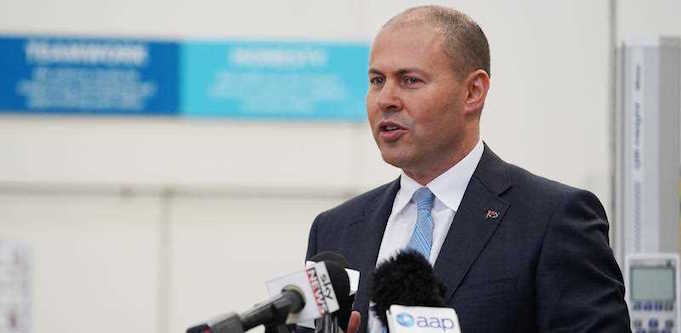
Treasurer Josh Frydenberg. Source: AAP/Stefan Postles.
By Graham White, University of Sydney
Treasurer Josh Frydenberg’s key message to business in a landmark speech on Monday was “back yourself”.
He said the best way to boost economic growth was to boost productivity, and the best way to do that was for businesses to undertake productivity-enhancing investments.
“My message today for business is to back yourself and use your balance sheet to invest and grow. With Australian corporates enjoying healthy balance sheets, record-low borrowing costs and strong equity market conditions, the question is: are corporates being aggressive enough in the pursuit of growth?”
On Thursday the Bureau of Statistics will release investment figures for the three months to June. The trend estimates for the three months to March showed mining investment down 2.8%, manufacturing investment down 4.3%, and other investment up just 0.7%.
According to Frydenberg, too many businesses are using funds that would have once been invested to buy back their own shares and return capital to their shareholders.
Why businesses don’t back themselves
He was effectively alluding to something that had come to notice as far back as the 1980s, and that has fascinated some economists (but mostly those outside the mainstream).
It is the incentive for firms to avoid the difficult and risky search for the long-term returns that can come from expansion and modernisation and instead maximise immediate shareholder value.
To the extent that it inhibits growth, it certainly doesn’t help the economy.
But if his speech was meant to be a piece of moral suasion directed at corporations, I fear it missed the point and might, in any case, be fruitless.
Decisions about whether to invest come down to views about returns from investments, and they come down to views about likely growth in consumer and business spending.
Consumers aren’t spending
Put another way, investing in new capacity is ultimately about whether or not there will be demand for the goods and services that will be produced by the new capacity.
Right now, to state the bleeding obvious, the outlook for spending isn’t particularly rosy.
We’ve sluggish consumer demand, sluggish business demand, and are facing sluggish overseas demand, in part because of an impending trade war, and in part from a government overreliant on using the Reserve Bank to stimulate the economy instead of its own spending.
In this sort of climate, I suspect no amount of moral suasion will improve the expected rates of return on investments in new capacity.
Investment can be counterproductive
Frydenberg is aware there is a demand problem, as his comments about trade agreements and public sector infrastructure projects indicate.
But in underplaying the need to create demand, his calls for investments that boost labour productivity bring with them a potential downside.
Enhanced productivity growth in the absence of sustained improvements in spending is likely to cost jobs or force up unemployment.
Being able to produce more with the same amount of labour means less employment, unless demand is increasing.
Of course, when demand does take off, the economy will need the capacity to meet it, so the concern with productivity-enhancing investment is legitimate. But it helps not to have it until it is clear demand is going to take off.
Frydenberg might be leaning to the view that once productivity grows, demand will be taken care of.
More productivity mightn’t always be good
It is a popular view that greater labour productivity (more production per worker) will create the conditions for faster wage growth which will itself boost consumer spending.
Frydenberg set it out at the beginning of his speech. Economic growth was driven by population, productivity and (labour market) participation.
There’s even a view that technological change will itself create jobs and consumer demand.
The counter proposition is that technological change displaces workers and generates technological unemployment.
It’s a debate with real-world Australian resonance. If Australian businesses did boost investment as Frydenberg wants, the improved productivity that resulted wouldn’t necessarily generate unemployment unless demand grew alongside it.
The question for us is whether the productivity growth would increase demand in and of itself, or whether the government would need to act to make sure it happened.![]()
This article is republished from The Conversation under a Creative Commons license. Read the original article.
NOW READ: How the Australian government stitched up its own tax office


COMMENTS
SmartCompany is committed to hosting lively discussions. Help us keep the conversation useful, interesting and welcoming. We aim to publish comments quickly in the interest of promoting robust conversation, but we’re a small team and we deploy filters to protect against legal risk. Occasionally your comment may be held up while it is being reviewed, but we’re working as fast as we can to keep the conversation rolling.
The SmartCompany comment section is members-only content. Please subscribe to leave a comment.
The SmartCompany comment section is members-only content. Please login to leave a comment.